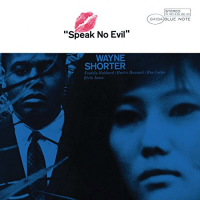Home » Jazz Articles » My Blue Note Obsession » Wayne Shorter: Wayne Shorter: Speak No Evil – 1964
Wayne Shorter: Wayne Shorter: Speak No Evil – 1964
For all his prowess on tenor, Shorter’s talent as a composer – on his solo albums and with groups – doesn’t get the attention it deserves.
 It's hard to imagine a jazz musician who has had more success with more bands than Wayne Shorter. His tenor sax was an essential part of three landmark combos: Art Blakey and the Jazz Messengers (1959-1964), Miles Davis' classic quintet (1964-70) and Weather Report (1971-86)—27 consecutive years of uninterrupted magnificence.
It's hard to imagine a jazz musician who has had more success with more bands than Wayne Shorter. His tenor sax was an essential part of three landmark combos: Art Blakey and the Jazz Messengers (1959-1964), Miles Davis' classic quintet (1964-70) and Weather Report (1971-86)—27 consecutive years of uninterrupted magnificence. In other words, if Shorter had never recorded a single album as a bandleader, he still would be among the greats on jazz's Mount Olympus.
But then, Shorter did record a bunch of solo records, and they are the highlights of his long, notable career. Amazingly, nearly all were recorded for Blue Note in the very same years that Shorter was playing with Miles Davis in one of the best and most famous jazz bands of all time. (It's as if Keith Richards had a string of monster albums at the same time he was anchoring the Rolling Stones.)
All of Shorter's Blue Note albums are wonderful, but Speak No Evil is arguably the best of the bunch.
At this point in his career, Shorter was straddling two jazz worlds. On one side was the hard bop world exemplified by his old band, the Jazz Messengers. On the other side was the avant-garde exemplified by some of Shorter's Blue Note stablemates, like Eric Dolphy and Ornette Coleman.
Speak No Evil contains elements of both. While it is closer to the hard bop camp, it still feels more post-bop than anything Art Blakey ever did. It features a fantastic two-horn attack with Shorter on tenor and Freddie Hubbard on trumpet. Throw in Elvin Jones' energetic bashing on drums and this is one mighty hard-rocking outfit. (Yes, Herbie Hancock is also featured on piano, but his playing sounds less distinctive and less essential to my ears than the Shorter-Hubbard-Jones power trio.)
All six tracks are outstanding, but my two favorites are at opposite extremes. "Speak No Evil," starts like a typical upbeat Blue Note hard bop session—like something borrowed from the Jazz Messengers. Hancock is bluesy in the background while the two horns state the theme in unison. Then Shorter starts wailing—conventionally at first, then a bit more wildly—and Jones goes into overdrive. Hubbard takes over and pushes it a little harder. Hancock takes a pretty solo, and then everyone winds up with the theme again. A real workout.
"Dance Cadaverous," on the other hand, is moody and atmospheric. Hancock plays swirling harmonies while the horns play a soft, breathless melody. But just when you think the song could sink into lounge-lizard yuckiness, the piano emerges with slightly off-kilter phrases. Shorter follows in a more avant-garde vein, as the drums tap-tap-tap an unusual rhythm. It's a pretty ballad that's more than just cuddly cuteness.
Speak No Evil is full of great performances. And most notably, every song was written by Shorter himself. For all his prowess on tenor, Shorter's talent as a composer—on his solo albums and with groups—doesn't get the attention it deserves.
Shorter has had a long, spectacular career. As a composer, a sideman and a leader, he never falls short. Speak No Evil is a career highlight that should be in everyone's collection.
(One minor quibble: Who put that god-awful red lipstick kiss above the classic Blue Note cover photo? Ick.)
Rating: 5 stars (out of 5)
Availability: Plentiful
Cost: Weird thing—Amazon sells the CD for $8, but the MP3s without the physical disc and liner notes for $9. So why get the MP3s?
Comments
Tags
Wayne Shorter
My Blue Note Obsession
Marc Davis
Art Blakey
Miles Davis
Weather Report
Eric Dolphy
Ornette Coleman
Freddie Hubbard
Elvin Jones
Herbie Hancock
For the Love of Jazz
 All About Jazz has been a pillar of jazz since 1995, championing it as an art form and, more importantly, supporting the musicians who create it. Our enduring commitment has made "AAJ" one of the most culturally important websites of its kind, read by hundreds of thousands of fans, musicians and industry figures every month.
All About Jazz has been a pillar of jazz since 1995, championing it as an art form and, more importantly, supporting the musicians who create it. Our enduring commitment has made "AAJ" one of the most culturally important websites of its kind, read by hundreds of thousands of fans, musicians and industry figures every month.



















